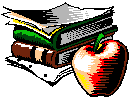 Rethinking
The Academy:
Rethinking
The Academy: Rethinking
The Academy:
Rethinking
The Academy:Picture the pencil just as it comes from the cellophane wrapped package - clean, bright yellow with the No. 2 stamped in gold or silver foil on the side, a new eraser ready to change what has gone before. And yet - as it stands - it is useless. The other end of the pencil ends abruptly: wood with an inner core of graphite. If you drag it along the page, nothing whatsoever happens. How do you proceed? What do you do?
Obviously: stick it into a pencil sharpener, get a good point on it and get to work.
Now pretend you've never seen a pencil.
What do you do now? Where do you start? In terms of computer use, our students and often we ourselves are in the same situation. We enter a student writing lab. Do we know what to do? Do we know how to proceed?
Our students look to us for the knowledge and for the expertise that they need to proceed. Especially in the first few weeks, we feel that having to admit that we don't know why students are getting a 404 error when they try to view the paper they've worked on for so many weeks in Netscape or Internet Explorer will destroy our easy superiority over them, will destroy our very classroom authority.
Of course it will - any time a teacher admits that she doesn't know the answer to a student's problem or question, the power relationships between that teacher and student can shift, especially if the teacher does more than make the standard teacherly response, "I'll have the answer for that for you tomorrow."
In fact, because this is not invisible technology, because we don't yet know the answer to how to sharpen the pencil in our computer labs, we have the opportunity to turn learning over to the students, and to say "I don't know. How can you find out?"
This model of teaching lets students stand out and take over the role of the teacher - in fact, many students will be far better at the technology than will be their teachers. Allowing them to teach what they know, or to serve as trouble-shooters for the classes' computer problems, will give them a chance to learn what teachers new to the technological classroom may not yet know: that allowing a student to be an expert in a given part of a given discipline may not necessarily undermine teacher authority and power to the detriment of the classroom experience, but may instead open the classroom to all sorts of new influences, ideas, and ways of getting the work of the class done. In fact, such an arrangement may be to the benefit of everyone involved.
Last Modified: August 2, 1996
Copyright © 1996 by Keith Dorwick